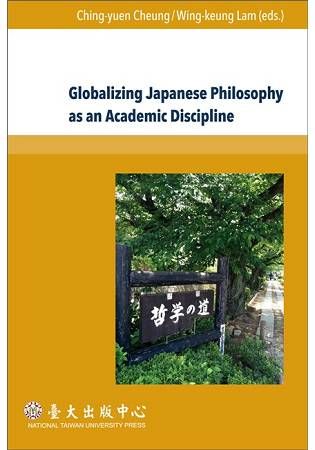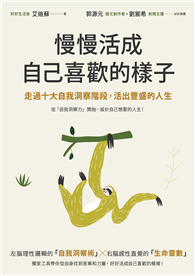| FindBook |
|
有 1 項符合
Wing-keung Lam的圖書 |
 |
$ 633 ~ 648 | Globalizing Japanese Philosophy as an Academic Discipline
作者:Chun-chieh Huang,Wing-keung Lam 出版社:國立臺灣大學出版中心 出版日期:2017-04-13 語言:繁體中文 規格:精裝 / 386頁 / 15.5 x 24 cm / 普通級/ 單色印刷 / 初版  共 5 筆 → 查價格、看圖書介紹 共 5 筆 → 查價格、看圖書介紹
|
|
|
圖書介紹 - 資料來源:博客來 評分:
圖書名稱:Globalizing Japanese Philosophy as an Academic Discipline
內容簡介
The book is divided into two parts, namely “Japanese Philosophy: Teaching and Research in the Global World” and “Japanese Philosophy as an Academic Discipline.” The first part integrates reports on the state of teaching and research of Japanese philosophy. The areas discussed are Japan, Canada, France, Spain and Englishspeaking regions. The second part contains contributions on various topics of Japanese philosophy, such as papers on Nishida Kitaro, Kuki Shuzo, Tanabe Hajime to Sakabe Megumi as a contemporary thinker. These articles not only show the topics of Japanese philosophical debate, but also the potential of Japanese philosophical thoughts.
作者介紹
作者簡介
Dr. Ching-yuen Cheung (張政遠)
Dr. Ching-yuen Cheung (張政遠) has taught philosophy for seven years and is currently lecturer at the Department of Japanese Studies at the Chinese University of Hong Kong.
Dr. Wing-keung Lam (林永強)
Dr. Wing-keung Lam (林永強) is currently Project Associate Professor at the Graduate School of Arts and Sciences at the University of Tokyo.
Dr. Ching-yuen Cheung (張政遠)
Dr. Ching-yuen Cheung (張政遠) has taught philosophy for seven years and is currently lecturer at the Department of Japanese Studies at the Chinese University of Hong Kong.
Dr. Wing-keung Lam (林永強)
Dr. Wing-keung Lam (林永強) is currently Project Associate Professor at the Graduate School of Arts and Sciences at the University of Tokyo.
目錄
Preface
Japanese Philosophy as an Academic Discipline: An Introduction
Part I: Japanese Philosophy: Teaching and Research in a Global World
James W. Heisig (Nanzan Institute for Religion & Culture)
Japanese Philosophy and its New Students
Jacynthe Tremblay (Hokkaido University)
Teaching and research on contemporary Japanese philosophy in Belgium, Canada and France
Raquel Bouso (Universitat Pompeu Fabra)
Broadening philosophy: learning experiences from Japanese thought
Alfonso Falero (Salamanca University)
The Meaning of Japanese Philosophy. A Spanish Perspective
Curtis Rigsby (University of Guam)
Constructing a Course in Japanese Philosophy
Satofumi Kawamura (University of Tokyo)
Japanese Philosophy in Japan: Research, Teaching and Politics
Part II: Japanese Philosophy as an Academic Discipline
Mayuko Uehara (Kyoto University)
The Philosophy of Nishi Amane – Toward the Creation of New Knowledge through Translational Inquiry
Michiko Yusa (Western Washington University)
Exploring the “Logic” of Topos with Sun Wukong
Katsuhito Inoue (Kansai University)
The Topic of Environmental Issues and The Japanese Philosophy
Liao Chin-ping (Sun Yat-sen University, China)
On the Cultural Discourses of Nishida Kitaro¯ and Suzuki Daisetsu
Lam Wing-keung (University of Tokyo)
Nishida Kitaro¯ and Confucian ethics: with a focus on “cheng”
Wong Yiu-hong (Chinese University of Hong Kong)
The Structure of iki and Hermeneutic Phenomenology
Yosuke Takehana (O¯ tani University, Japan)
The Logic of the Transcendence of Life. Tanabe’s Theory of “World Schema” and Miki’s “Logic of the Imagination”
Taguchi Shigeru (Hokkaido University)
Reality as it is. Nishida and Tanabe on appearance and mediation
Gereon Kopf (Luther College)
“Nishida, Tanabe, and Maha¯ya¯na Buddhism: A Blueprint for a Critical Philosophy”
Yasuo Kobayashi (Aoyama Gakuin University)
About Professor Megumi Sakabe
Notes on Contributors
Index of Names
Japanese Philosophy as an Academic Discipline: An Introduction
Part I: Japanese Philosophy: Teaching and Research in a Global World
James W. Heisig (Nanzan Institute for Religion & Culture)
Japanese Philosophy and its New Students
Jacynthe Tremblay (Hokkaido University)
Teaching and research on contemporary Japanese philosophy in Belgium, Canada and France
Raquel Bouso (Universitat Pompeu Fabra)
Broadening philosophy: learning experiences from Japanese thought
Alfonso Falero (Salamanca University)
The Meaning of Japanese Philosophy. A Spanish Perspective
Curtis Rigsby (University of Guam)
Constructing a Course in Japanese Philosophy
Satofumi Kawamura (University of Tokyo)
Japanese Philosophy in Japan: Research, Teaching and Politics
Part II: Japanese Philosophy as an Academic Discipline
Mayuko Uehara (Kyoto University)
The Philosophy of Nishi Amane – Toward the Creation of New Knowledge through Translational Inquiry
Michiko Yusa (Western Washington University)
Exploring the “Logic” of Topos with Sun Wukong
Katsuhito Inoue (Kansai University)
The Topic of Environmental Issues and The Japanese Philosophy
Liao Chin-ping (Sun Yat-sen University, China)
On the Cultural Discourses of Nishida Kitaro¯ and Suzuki Daisetsu
Lam Wing-keung (University of Tokyo)
Nishida Kitaro¯ and Confucian ethics: with a focus on “cheng”
Wong Yiu-hong (Chinese University of Hong Kong)
The Structure of iki and Hermeneutic Phenomenology
Yosuke Takehana (O¯ tani University, Japan)
The Logic of the Transcendence of Life. Tanabe’s Theory of “World Schema” and Miki’s “Logic of the Imagination”
Taguchi Shigeru (Hokkaido University)
Reality as it is. Nishida and Tanabe on appearance and mediation
Gereon Kopf (Luther College)
“Nishida, Tanabe, and Maha¯ya¯na Buddhism: A Blueprint for a Critical Philosophy”
Yasuo Kobayashi (Aoyama Gakuin University)
About Professor Megumi Sakabe
Notes on Contributors
Index of Names
序
序
Japanese Philosophy as an Academic Discipline: An Introduction
The essays collected in this book are some of the papers presented in the International Conference: Japanese Philosophy as an Academic Discipline, a conference organized by the Chinese University of Hong Kong (CUHK) in December 2011. The book is divided into twoparts, namely, “Japanese Philosophy: Teaching and Research in a Global World;” and “Japanese Philosophy as an Academic Discipline.”
In the first part, there are reports of the situation of teaching and research of Japanese philosophy. The areas discussed are Japan, Canada, France, Spain and English-speaking regions. 2011 is the year of the publication of Japanese Philosophy: A Sourcebook. James Heisig, one of the editors of Japanese Philosophy: A Sourcebook, gives us a general introduction of the sourcebook project, and its promise as an important teaching resource about Japanese philosophy. In the second part, there will be papers on varies topics on Japanese philosophy, such as papers on Nishida Kitaro, Kuki Shuzo, Tanabe Hajime to contemporary thinker such as Sakabe Megumi. These papers not only show the topics on Japanese philosophical debates, but also are the potential of Japanese philosophical thoughts.
Back in August 2010, there was a workshop organized by University of Tokyo Center for Philosophy (UTCP) titled “The Possibility of Making Japanese Philosophy an Academic Discipline.” Nakajima Takahiro, the organizer of this conference, suggests that “[W]e are now trying to understand Japanese Philosophy as a challenge to think of our world differently. We don’t want to stabilize Japanese Philosophy in an established department, but to use it as a tool to intervene and shake the academic apparatus as it exists in the modern university system.”
Nakajima and the editors of this book, as well as many other colleagues, later applied for a grant titled “Japan Studies Based on International Collaboration,” a competitive grant by Japan Society for the Promotion of Science (JSPS). According to JSPS, “the promotion of internationalization is an important aspect of humanities and social science research in Japan, particularly those with a focus on subjects related to Japan (Japan Studies).” “Furthermore, Japan Studies is losing its special status overseas, on its way to being relegated to merely one area of Asian Studies.” “Therefore, it is important to promote Japan Studies abroad through international collaboration, by providing support for existing Japan Studies with the aim of securing an international demographic that possesses a deeper understanding of Japan.”
We proposed a project called “Constructing an International Research Ground for Japanese Philosophy.” Taking Chinese philosophy as an example, we notice that it is well-recognized as a branch of philosophy, and there are many scholars and students working on Chinese philosophy. However, the situation is quite different in Japanese philosophy. On the level of research, there are prestigious academic journals for Chinese philosophy, but there is not a single peerreviewed academic journal for Japanese philosophy at the time of our application. In order to make Japanese philosophy as an academic discipline, we believed that it is important to seek for the possibilities of establishing an international journal, an international association and perhaps a research center. The project was an attempt to realize these possibilities.
We proceeded to the final round of hearing, but the grant application failed. “Japanese philosophy as an academic discipline” became an unfinished project. Although we failed to get the grant, we managed to establish the Journal of Japanese Philosophy (SUNY) in 2013, International Association of Japanese Philosophy in2014, and the book series called TetsugakuCompanions to Japanese Philosophy (Springer) in 2015. These ongoing projects would not be realized without the supports of all our colleagues and friends. We strongly believe that Japanese philosophy should be an open platform for all readers. We are trying to demonstrate the potential of Japanese Philosophy, but not to limit Japanese philosophy to a single philosophical tradition or school.
We would like to express our heartfelt thanks to Prof. Huang Chun-chieh, who has been supportive to the idea of making Japanese Philosophy as an Academic Discipline. It has been a privilege for us to have the full support from Institute for Advanced Studies in Humanities and Social Sciences (IHS), National Taiwan University. We would like to thank Amy Chin and Linda Yu for their editorial support to the publication of this book.
Japanese Philosophy as an Academic Discipline: An Introduction
The essays collected in this book are some of the papers presented in the International Conference: Japanese Philosophy as an Academic Discipline, a conference organized by the Chinese University of Hong Kong (CUHK) in December 2011. The book is divided into twoparts, namely, “Japanese Philosophy: Teaching and Research in a Global World;” and “Japanese Philosophy as an Academic Discipline.”
In the first part, there are reports of the situation of teaching and research of Japanese philosophy. The areas discussed are Japan, Canada, France, Spain and English-speaking regions. 2011 is the year of the publication of Japanese Philosophy: A Sourcebook. James Heisig, one of the editors of Japanese Philosophy: A Sourcebook, gives us a general introduction of the sourcebook project, and its promise as an important teaching resource about Japanese philosophy. In the second part, there will be papers on varies topics on Japanese philosophy, such as papers on Nishida Kitaro, Kuki Shuzo, Tanabe Hajime to contemporary thinker such as Sakabe Megumi. These papers not only show the topics on Japanese philosophical debates, but also are the potential of Japanese philosophical thoughts.
Back in August 2010, there was a workshop organized by University of Tokyo Center for Philosophy (UTCP) titled “The Possibility of Making Japanese Philosophy an Academic Discipline.” Nakajima Takahiro, the organizer of this conference, suggests that “[W]e are now trying to understand Japanese Philosophy as a challenge to think of our world differently. We don’t want to stabilize Japanese Philosophy in an established department, but to use it as a tool to intervene and shake the academic apparatus as it exists in the modern university system.”
Nakajima and the editors of this book, as well as many other colleagues, later applied for a grant titled “Japan Studies Based on International Collaboration,” a competitive grant by Japan Society for the Promotion of Science (JSPS). According to JSPS, “the promotion of internationalization is an important aspect of humanities and social science research in Japan, particularly those with a focus on subjects related to Japan (Japan Studies).” “Furthermore, Japan Studies is losing its special status overseas, on its way to being relegated to merely one area of Asian Studies.” “Therefore, it is important to promote Japan Studies abroad through international collaboration, by providing support for existing Japan Studies with the aim of securing an international demographic that possesses a deeper understanding of Japan.”
We proposed a project called “Constructing an International Research Ground for Japanese Philosophy.” Taking Chinese philosophy as an example, we notice that it is well-recognized as a branch of philosophy, and there are many scholars and students working on Chinese philosophy. However, the situation is quite different in Japanese philosophy. On the level of research, there are prestigious academic journals for Chinese philosophy, but there is not a single peerreviewed academic journal for Japanese philosophy at the time of our application. In order to make Japanese philosophy as an academic discipline, we believed that it is important to seek for the possibilities of establishing an international journal, an international association and perhaps a research center. The project was an attempt to realize these possibilities.
We proceeded to the final round of hearing, but the grant application failed. “Japanese philosophy as an academic discipline” became an unfinished project. Although we failed to get the grant, we managed to establish the Journal of Japanese Philosophy (SUNY) in 2013, International Association of Japanese Philosophy in2014, and the book series called TetsugakuCompanions to Japanese Philosophy (Springer) in 2015. These ongoing projects would not be realized without the supports of all our colleagues and friends. We strongly believe that Japanese philosophy should be an open platform for all readers. We are trying to demonstrate the potential of Japanese Philosophy, but not to limit Japanese philosophy to a single philosophical tradition or school.
We would like to express our heartfelt thanks to Prof. Huang Chun-chieh, who has been supportive to the idea of making Japanese Philosophy as an Academic Discipline. It has been a privilege for us to have the full support from Institute for Advanced Studies in Humanities and Social Sciences (IHS), National Taiwan University. We would like to thank Amy Chin and Linda Yu for their editorial support to the publication of this book.
by Cheung Ching-yuen and Lam Wing-keung
|











